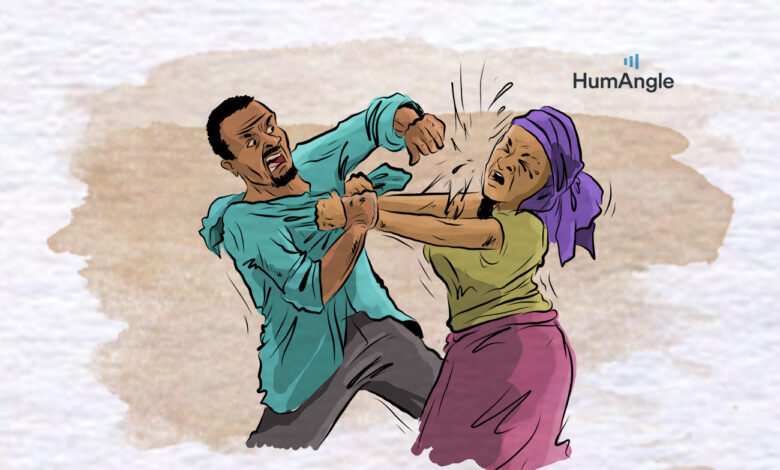‘In Private, He Abuses Me, Then Compliments Me In Public’
When she entered into an arranged marriage at the age of 18, Habiba was excited about her new life, but her new husband wasn’t who she believed he was.

When the man Habiba* would marry proposed, she was excited to start a new life with him. Even though the marriage was mainly arranged by both families, the optimistic 18-year-old who lives in Kaduna, Nigeria’s Northwest, at first believed her husband was a good man. They had been family friends. So she wasn’t bothered by the nature of the union. She only wanted to make the most out of the situation.
However, she sensed something was wrong with the wedding and tried to call it off, but her family refused, saying they wouldn’t let her bring shame on them.
Then things took a turn eight days after the marriage. “I have a permanent bruise on my right cheek because I said I wasn’t ready to engage in sexual activities with him,” she told HumAngle.
Habiba wanted to get to know the man she had married better before any kind of intimacy. But he didn’t like the fact that she dared to say no to his advances.
“I started to put on a fight hoping that will deter him, but then he started to bind me. He would tie my arms and feet to the bed posts and when I try to scream, he will muffle them and even choke me. He would say that it turned him on to see me all red when I struggled to breathe.”
Before the Violence Against Persons (Prohibition) Act came into being, there was no law against marital rape in Nigeria as rape was seen as an act outside wedlock. But now, women can sue their husbands for rape in states where the Act has been domesticated.
When the cycle of rape and abuse persisted, Habiba started to lock herself up when he came home and sometimes they wouldn’t see each other for weeks.
After a few months, he stopped when he discovered she was pregnant. But that didn’t end the abuse; he only shifted from physical to emotional abuse.
“He would tell me how unattractive I was during that time. He would talk about how tiny my breasts were and say things like he is a happier person when he is not sleeping with me because of how ugly I was,” she narrated.
Habiba’s ex liked to tell her how she would never be enough for him or anybody else and, because of his cruel words, she still struggles with accepting or loving her body even after four years.
“I cannot hold my breasts without hearing his voice in my head telling me how ugly, small and not enough they are,” she said.
People tend to undermine the effects of emotional abuse as abuse is usually believed to be physical. This kind of abuse undermines a person’s self-worth and has long-lasting effects. About 4 in 10 women experience abusive control by an intimate partner in their lifetime. Even though emotional abuse is a crime punishable with not more than one- year imprisonment or a fine of not more than N200,000 or both in Nigeria, it is still common in marriages.
One popular tactic that abusers use is isolation and Habiba’s ex was no exception. “I would have to beg him to let me see my family. He would lock the freezers and storeroom, making sure that I starved. He would also take away the TV cable and my phone charger or make sure that I have no airtime to contact anybody.”
However, when guests came to the house, he turned caring and sweet. He would hug, kiss, and compliment her in front of everyone, making it more difficult for her to be believed when she eventually decided to come out with her story.
“When I gave birth, he would only leave enough tea condiments for our son,” she continued.
It was Habiba’s mother who started to notice that something was not okay. At first, she thought her daughter was not visiting because she was busy with her wifely responsibilities, but when she came home after giving birth to her son, she confronted her. Habiba, at first, refused to speak because she was terrified that her husband would take her son away from her and was worried about the societal stigma that divorced women and survivors of violence faced. But after she lost two pregnancies because of him, one day she asked her mother if she could come back home and her mother said yes. “Even though I had to give up my son, I don’t regret it. It was the most difficult decision I ever had to make but I will make it again,” she said.
Her ex-husband never hit her directly, but he would shove her, spill hot tea on her and had once slashed her with a kitchen knife while pretending to help her. When she lost her last pregnancy, he pushed a bed side mirror towards her and it broke over her. He then proceeded to tell people that it happened because she didn’t listen and move out of the way on time. He added that she did that deliberately because she didn’t want to have more children with him.
It’s been years since Habiba got the courage to leave him but his ghost follows her everywhere. “I am extremely jumpy. Sometimes I get jumpy when people move their hands too quickly, even if the person sitting next to me just reached out to adjust their glasses and, according to my friends, I flinch and have a startled deer-like look till someone snaps me out of it or I manage to snap out of it myself. I am always anxious and my self-esteem is at the bottom of the barrel. I still find it hard to accept compliments.”
Then there is the issue of trusting people, especially men, and she gets worried and anxious when she sees a man showering his wife or girlfriend with affection in public and wonders if the woman is alright. Even though Habiba has remarried a kind and loving man, she still struggles with completely trusting herself and her new husband.
“The biggest risk I have taken since my experience is trusting and marrying my husband. He is incredibly good to me. It took me years to trust him, and even longer to let him touch me. I am scared that because he is a man, his depravity switch might one day get turned on and he will use my trauma against me. But despite these fears, he is my greatest source of hope.”
Habiba’s husband takes her to therapy and does everything in his power to make sure that she knows she is loved and valued. “I can even look at myself in the mirror these days. He showers me with so many words of affirmation that it gets annoying sometimes.”
Today, Habiba still freezes when she sees her ex-husband. “People still tell me I am stupid for leaving such a kind, caring man, but I want all survivors to know that it’s never their fault. Most importantly I want people to be kinder to survivors and stop dismissing emotional abuse.”
Support Our Journalism
There are millions of ordinary people affected by conflict in Africa whose stories are missing in the mainstream media. HumAngle is determined to tell those challenging and under-reported stories, hoping that the people impacted by these conflicts will find the safety and security they deserve.
To ensure that we continue to provide public service coverage, we have a small favour to ask you. We want you to be part of our journalistic endeavour by contributing a token to us.
Your donation will further promote a robust, free, and independent media.
Donate HereStay Closer To The Stories That Matter




